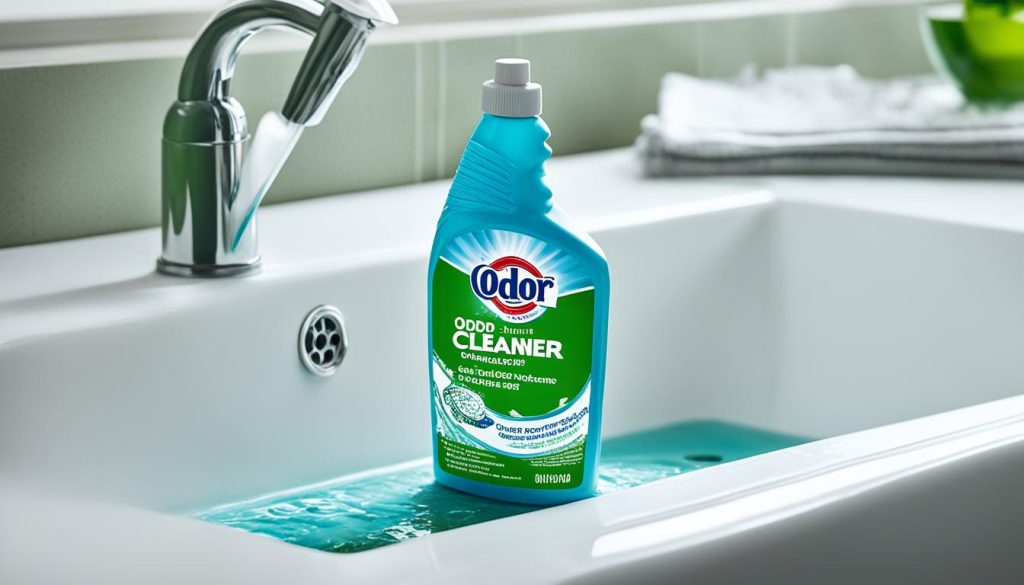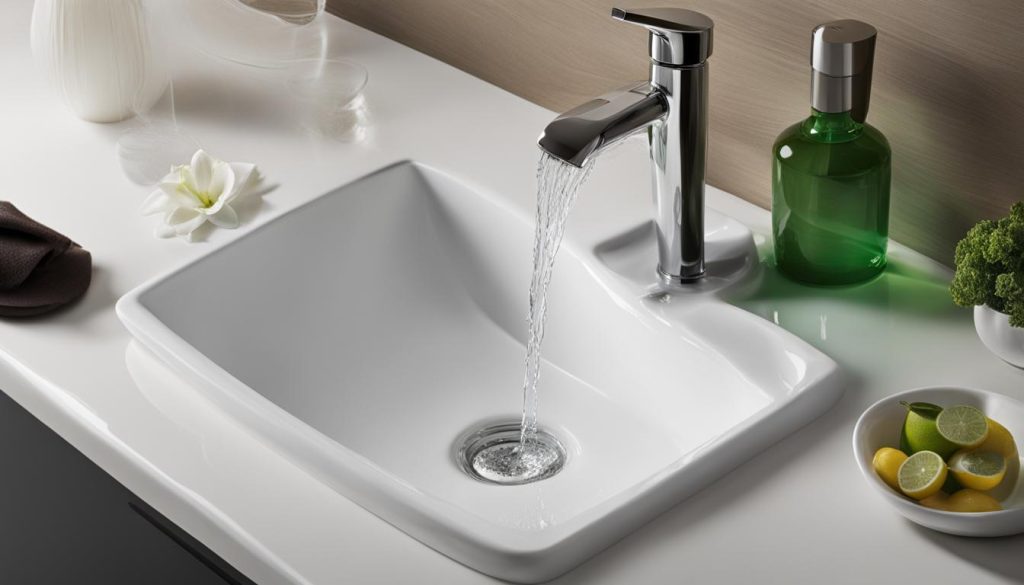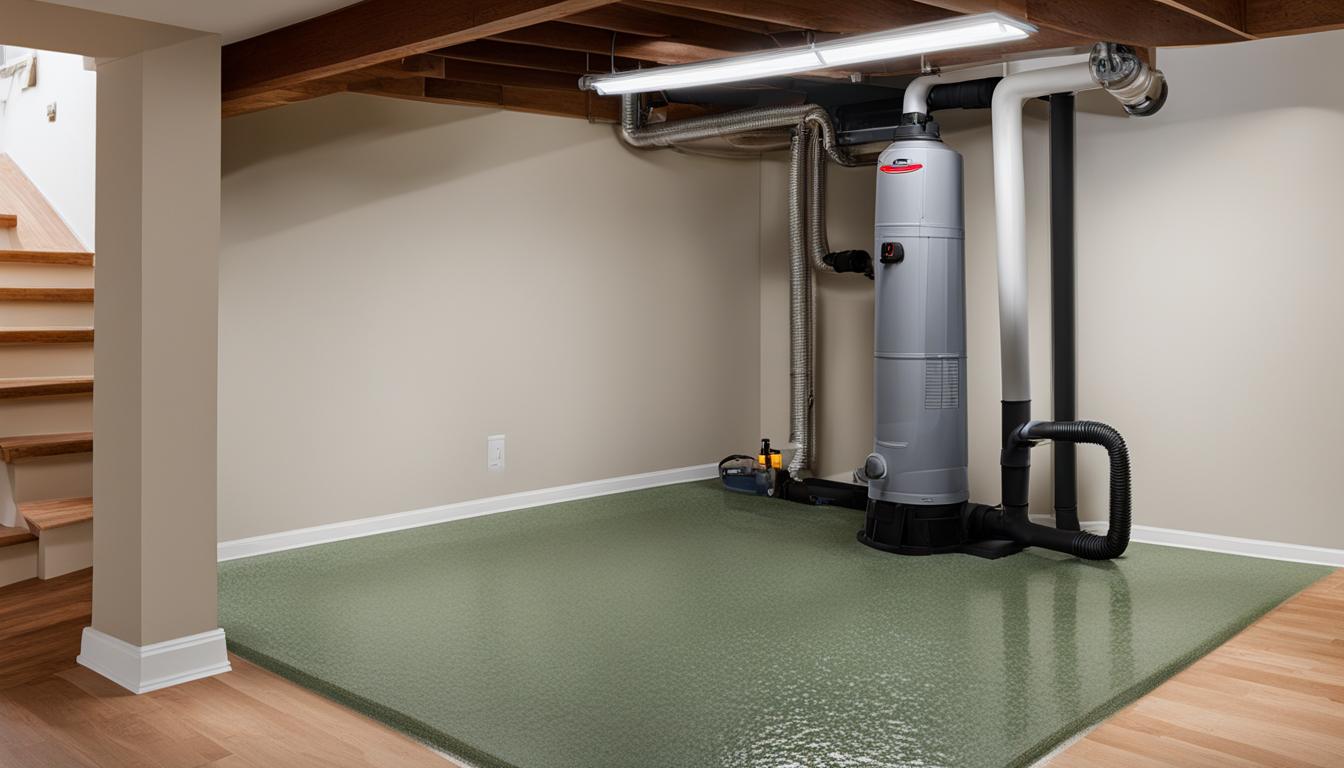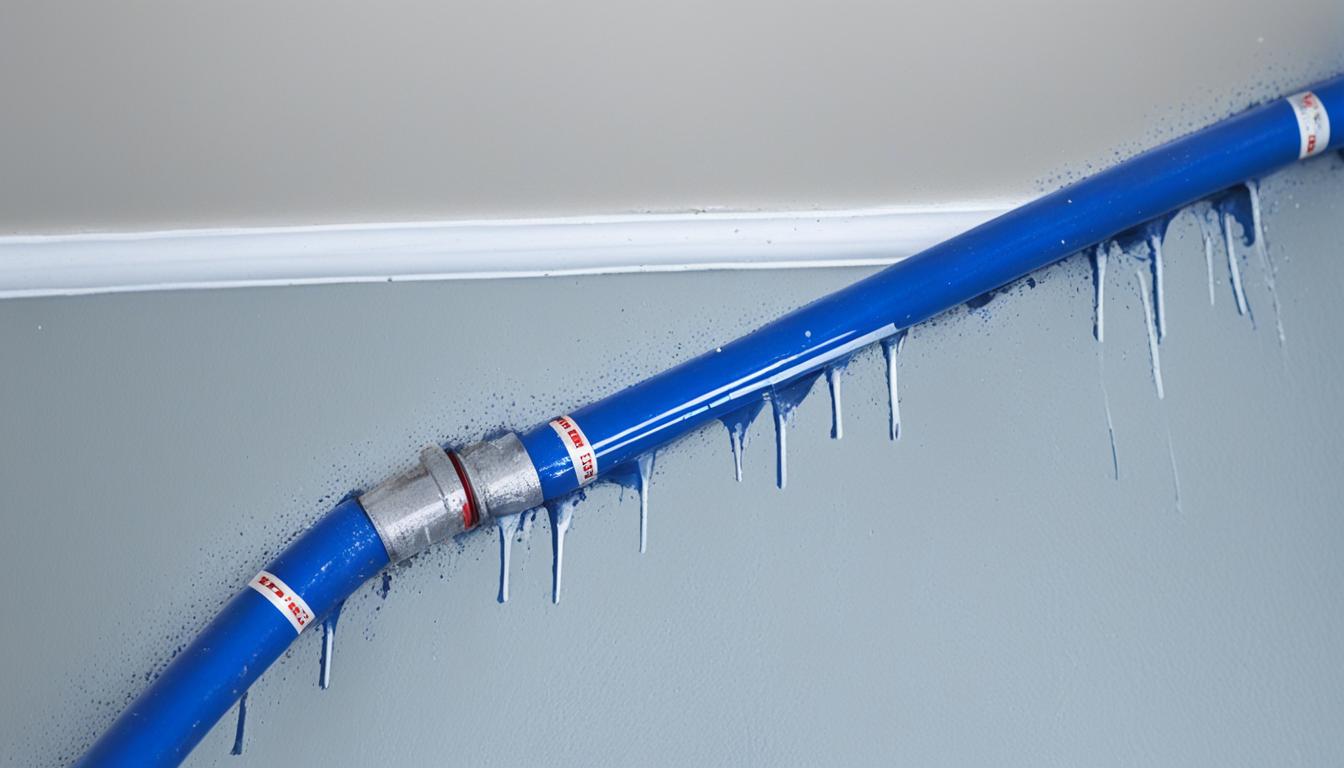Banish Stinky Sink Drain Odors for Good!
Did you know that a staggering 75% of Canadian households experience the problem of stinky sink drain odors? That’s right, the foul smell emanating from kitchen sinks is a widespread issue that affects a significant number of homeowners. The good news is that you don’t have to put up with these unpleasant odors any longer. With simple remedies and effective tips, you can eliminate those stinky sink drain odors for good and enjoy a fresh-smelling kitchen.
Key Takeaways:
- 75% of Canadian households face the issue of stinky sink drain odors.
- You can banish foul odors by following simple remedies.
- Understanding the causes of the odor is crucial for effective elimination.
- Using natural remedies and cleaning the P-trap can help freshen up your drain.
- Preventing future smelly drains requires mindful practices and proper maintenance.
Understanding the Causes of Stinky Sink Drains
The primary cause of stinky sink drains is the accumulation of hair, dirt, mildew, and bacteria slime in the pipes. When the water flows down the drain, it can dislodge these particles and release a foul odor. Additionally, if you have a garbage disposal, food remnants can also contribute to the unpleasant smell. It’s important to determine whether the odor is coming from the drain or the water itself. By plugging the sink and running the water, you can confirm if you have a smelly drain issue.
The Role of Debris
Debris such as hair, dirt, and mildew can collect in the pipes over time. When water passes through, it can disturb these particles and release an unpleasant odor into the air.
The Impact of Bacteria
Bacteria slime, which often forms in damp environments, is another culprit behind smelly sink drains. As water flows through the pipes, it can disturb the bacteria and create an unpleasant odor.
The Contribution of Garbage Disposals
If you have a garbage disposal, food remnants can get stuck and decompose, leading to an unpleasant smell. The combination of old food and moisture can create a breeding ground for bacteria and mold.
Identifying the Source
To determine whether the odor is coming from the drain or the water itself, plug the sink and run the water. If the smell persists, it is likely that you have a smelly drain issue. On the other hand, if the odor only occurs when the water is running, the problem may be with the water supply or plumbing system.
| Cause of Odor | Description |
|---|---|
| Debris Accumulation | Particles such as hair, dirt, and mildew can collect in the pipes and release an unpleasant odor when disturbed by water flow. |
| Bacteria Slime | Bacteria slime that forms in damp environments can contribute to smelly sink drains when disrupted by water flow. |
| Garbage Disposal Buildup | Food remnants trapped in the garbage disposal can decompose and create an unpleasant smell, exacerbated by moisture and bacteria growth. |
Natural Remedies to Eliminate Odors
Instead of relying on chemical drain cleaners that can be harmful to your pipes and health, there are natural remedies you can use to eliminate odors from your sink drain. One effective method is to pour a couple of quarts of hot water down the drain followed by a few quarts of cold water. This can help flush out any debris and eliminate the smell.
Additionally, you can try using a combination of white vinegar and baking soda or vinegar and salt to break up clogs and neutralize odors. These household items are safe to use and can effectively freshen up your drain.
The Hot Water Flush Method:
- Boil a couple of quarts of water.
- Pour the hot water down the drain, allowing it to work its way through the pipes.
- Follow up with a few quarts of cold water to help remove any remaining debris.
Vinegar and Baking Soda/Salt Solution:
- Mix equal parts white vinegar and baking soda/salt in a bowl.
- Pour the mixture down the drain.
- Let it sit for about 30 minutes.
- Flush the drain with hot water to remove the residue and eliminate the odor.
These natural remedies are not only effective in eliminating odors but are also safe for your plumbing system and the environment. Give them a try before resorting to harsh chemical cleaners.
| Natural Remedies | Benefits |
|---|---|
| Hot water flush | – Flushes out debris – Eliminates odor – No harmful chemicals |
| Vinegar and baking soda/salt solution | – Breaks up clogs – Neutralizes odors – Safe for plumbing |
Dealing with Garbage Disposal Odors
If the smell is coming from your garbage disposal, there are specific steps you can take to eliminate the stench. Running the disposal and using ice to clean off the blades can help remove any buildup and improve the odor. You can also add citrus peels, such as orange, lemon, or lime, down the disposal and run it for a fresh citrus scent. The natural acids in the fruit peels can help clear the drain and eliminate the odor.
Dealing with garbage disposal odors requires a targeted approach to eliminate the sink stench. The combination of food particles and bacteria in the disposal can create unpleasant odors that waft through your kitchen. By following these simple steps, you can freshen up your disposal and enjoy a clean-smelling kitchen.
- Run the disposal: Start by turning on the disposal and letting it run for a few minutes. This will help dislodge any stuck food particles and debris.
- Use ice cubes: Drop a few ice cubes into the disposal and let it run. The ice will help to clean and sharpen the blades, removing any residue that may be contributing to the odor.
- Add citrus peels: Toss in some citrus peels, such as orange, lemon, or lime, into the disposal. Turn it on and let the blades grind up the peels. Not only will this freshen up the smell, but the natural acids in the peels can help to break down any leftover food particles.
- Clean the disposal: After running the ice and citrus peels, it’s a good idea to clean the disposal further. Mix equal parts of vinegar and baking soda in a cup and pour it into the disposal. Let it sit for a few minutes, then flush with hot water. This will help to eliminate any remaining odors and keep your disposal clean and fresh.
By following these steps regularly, you can keep your garbage disposal odor-free and prevent the sink stench from returning. Remember to always exercise caution when working with the disposal and avoid putting any non-food items or hard materials down the drain. With proper care and maintenance, your garbage disposal can continue to function efficiently and keep your kitchen smelling fresh.
Cleaning the P-Traps
If you have tried various remedies and the odor persists, it might be time to clean out the P-traps under your sink. The P-trap is the rounded pipe that holds water to prevent sewer gases from backing up into your sink. It can become clogged or dry out, leading to unpleasant odors.
You can easily clean the P-trap yourself using basic tools like a bucket or container, pliers, and a wire coat hanger or bottle brush. Simply follow these steps:
- Place a bucket or container under the P-trap to catch any water or debris that may come out.
- Use pliers to loosen the nuts or connectors holding the P-trap in place.
- Once the nuts are loosened, carefully remove the P-trap from the pipes.
- Clean out any gunk, hair, or debris from the P-trap using a wire coat hanger or bottle brush.
- Flush the P-trap with water to ensure it is completely clean.
- Reattach the P-trap to the pipes, making sure the nuts are securely tightened.
This simple cleaning process can help eliminate the odor and keep your sink smelling fresh. Remember to dispose of any debris properly and clean the bucket or container used to catch the water and debris.
Preventing Future Smelly Drains
As a homeowner, I’ve learned that preventing smelly drains is essential to maintaining a fresh-smelling kitchen. By being mindful of what goes down your sink, you can avoid the unpleasant odors that often accompany clogged and dirty pipes. Here are some simple tips to help you keep your drains odor-free.
First and foremost, avoid pouring oils, fats, starchy foods like potatoes and rice, and fibrous or membranous foods like vegetable peels and eggshells down the drain. These items can create blockages and contribute to the development of foul smells. Instead, dispose of them in the trash or compost.
Another effective way to prevent smelly drains is by using mesh strainers in your kitchen sink drains. These strainers can catch solid food particles and prevent them from entering the pipes, ultimately reducing the risk of clogs and foul odors. Simply place the strainer over the drain and empty it regularly to keep your pipes free from debris.
When it comes to freshening up your drain, using the best drain cleaner for smell is essential. Look for products that are specifically designed to eliminate odors and maintain the cleanliness of your pipes. These drain cleaners can break down grease, hair, and other buildup that can cause unpleasant smells, leaving your drain fresh and odor-free.
- Investing Wisely: How Windows & Doors in Boost Property Value and Financial Health - April 24, 2025
- The Financial Impact of Personal Injuries: Why Legal Help Matters for Business Owners - April 16, 2025
- The Hidden Financial Costs of Domestic Assault: What Business Owners Need to Know - April 16, 2025














